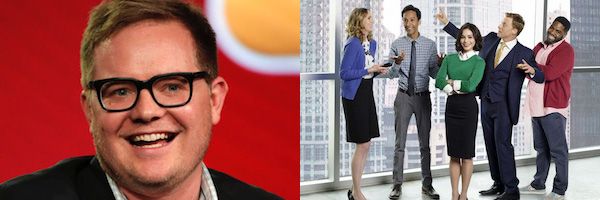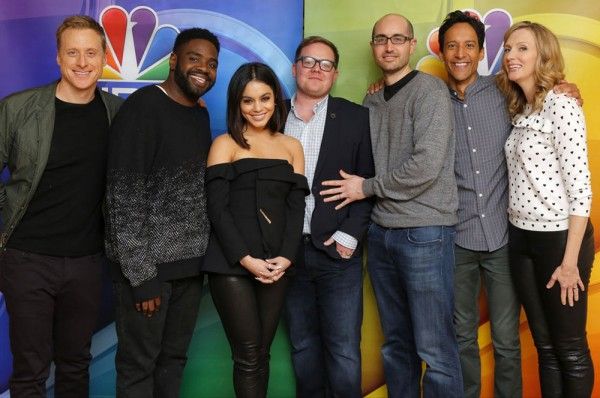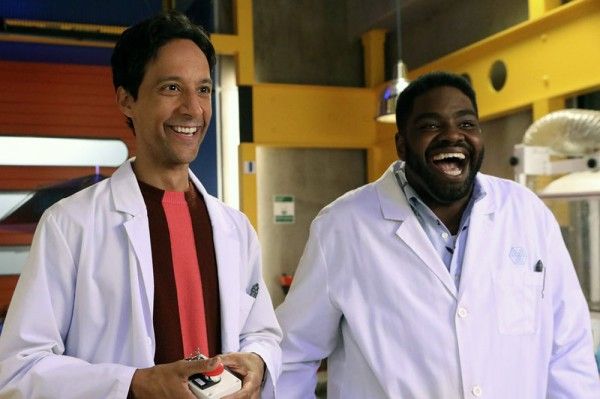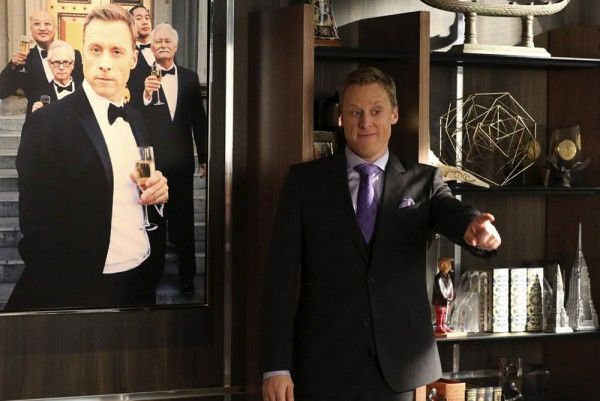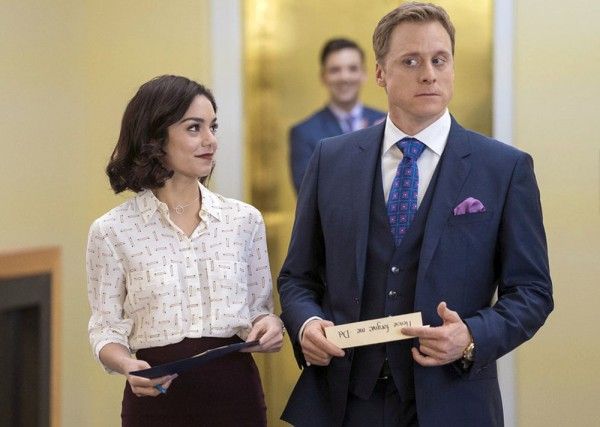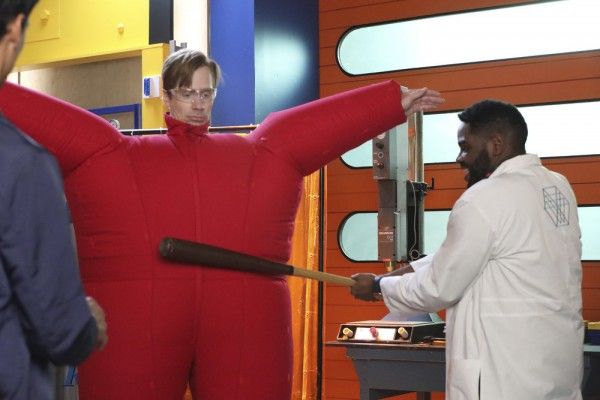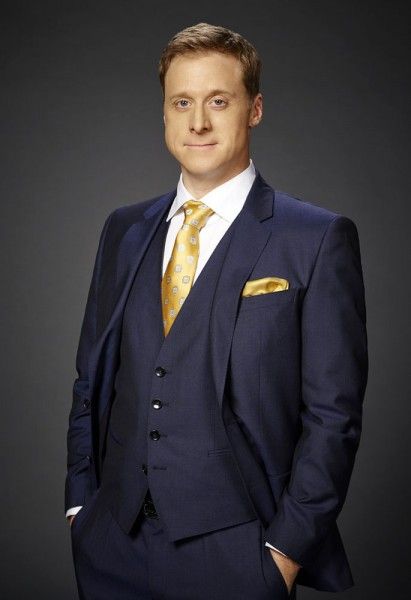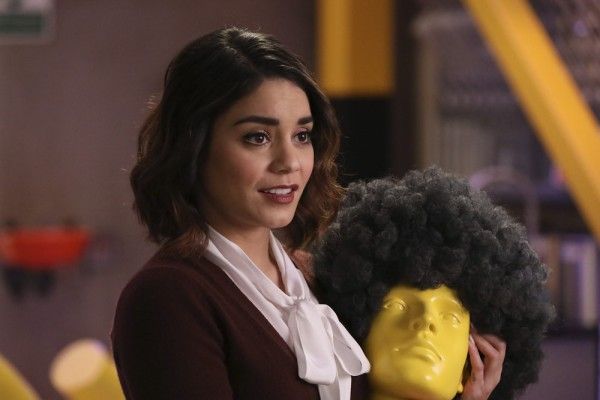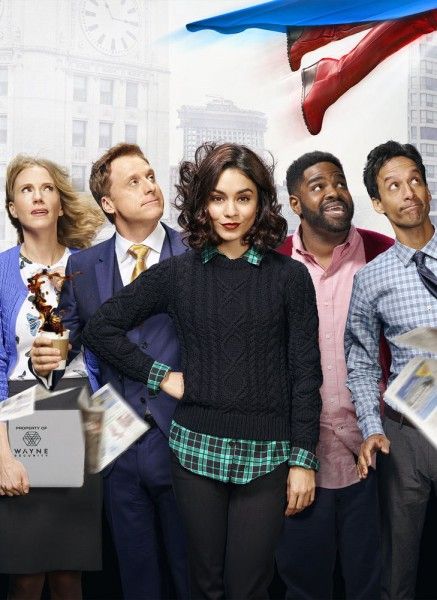The NBC comedy series Powerless is set in a world where humanity must cope with the collateral damage of superheroes and supervillains while Wayne Security, a subsidiary of Wayne Enterprises, specializes in inventing and marketing products that make defenseless bystanders feel a little safer. Emily Locke (Vanessa Hudgens) is the new Director of Research & Development for a team that she must convince to live up to their full potential, under a boss, Van Wayne (Alan Tudyk), who’s just looking to leave Charm City behind to join Bruce Wayne in Gotham.
During this 1-on-1 phone interview with Collider, executive producer Patrick Schumacker (who is co-showrunner with Justin Halpern) talked about how he got involved with Powerless, how the series evolved into what it is now, finding the right tone, Easter eggs and nods to the DC universe, the process for working DC characters into the show, not feeling the need to invent new superheroes and supervillains, at this point, the challenge of giving Bruce Wayne a personality when he’s not physically present, how Van Wayne is different from his cousin, and possible ideas for Season 2.
Collider: Since you didn’t originally create this show, how did you come to Powerless?
PATRICK SCHUMACKER: Justin [Halpern] and I are on a deal at Warner Bros., where we’re under contract with the studio, and we were developing some shows on our own. What ended up happening was that, when the show was picked up and Ben Queen was running it, the studio asked us to meet with him and potentially staff on the show, and that’s what happened. We were consulting producers, five days a week, working under Ben. We were with it, the entire time. And then, several weeks into pre-production, the studio and the network made a mutual agreement that they wanted to take the show in a different direction, and they tapped us to do that. Basically, that’s what happened. We were with it, all along, and then we were asked to take over. I’ve gotta give Ben all the credit in the world for developing the show and putting the cast together. We used pretty much everybody who was in the original pilot, and Ron Funches, additionally. We only recast one role from the pilot to now.
But the show was completely reconceived, which was a joint venture between us, DC, Warner Bros. and NBC. The show shut down for about a month, back in August, while Justin and I rolled up our sleeves and tried to come up with a more in-depth take on what we were doing. We met with DC several times. We sat down with Geoff Johns and Aria Moffly from DC, and in that meeting, the security angle came about. The original premise was insurance, and we decided that we wanted to do something that was more product-based, so we came up with the security angle. And then, we were going to put them in sales because that’s an easy thing to understand, but NBC asked if we could do something more along the lines of R & D because that would differentiate the show from something like The Office, that people are already familiar with.
So, we really embraced that and ran with that. We thought the R & D and more techie angle of it felt like a really cool, different way of going in the series. The marketing for the show is really leaning into that R & D, gadgetry, invention angle, and we leaned fairly heavily into that in the pilot, but in any workplace comedy, you want to eventually start telling more interpersonal stories between the characters and that’s what we start to lean into, even more, even though the backdrop is an R & D team that’s creating and designing products that help the powerless feel safe in a world where superheroes and supervillains are doing battle in the skies above.
We’ve got so many DC Comics shows to choose from on TV now, but this is the first comedy in that world. Was there any specific talk about keeping the tone of this show lighter than that of the films? Did you talk about the kind of tone that you feel is right, for the story that you’re telling?
SCHUMACKER: There wasn’t a huge discussion because the studio is very familiar with Justin and I. We’ve been working for Warner Bros. for a really long time, and we had actually been developing another project with DC prior to this, so they were familiar with us. Everything that we’ve done is of a specific tone. With the exception of working on iZombie, last year, as consulting producers, we’ve only worked in half-hour comedy. The shows that we’ve created, which were Shit My Dad Says and Surviving Jack, are of a specific tone, and we waned to try to recapture that sort of tone in this show, as well. I think everybody was on board with that. They know what we do best, or at least what we’ve done, in the past. So, there wasn’t so much of a discussion with DC about tone, other than they certainly want to embrace the lighter side of the comics.
As everyone is aware, their film side is of a darker tone, but their television side has a lot more levity, even the dramas on The CW. This has even more of that. I’m a huge comic book fan and I am very familiar with the lighter side of DC. I’m a huge Garth Ennis fan. I’m a big Mark Waid fan. I have his work on The Flash, and Garth Ennis’ work on Hitman. There is a flat-out, legitimately funny side to the DC universe that is untapped. Tonally, hopefully this show is along those lines, and has the tone that people would come to expect in a regular workplace comedy. As far as the interpersonal storylines are concerned and the relationships between co-workers, it is grounded, but it is set in a world where really heightened things can kick off stories. You’re living in a world where the watercooler talk is about Wonder Woman’s nip slip when she was fighting Brainiac. It’s some really interesting opportunities to organically work in the mythology from DC and the lighter side of DC mythology.
In the pilot, you had a joke that pokes fun at Batman v. Superman. Do you work those types of jokes in, wherever and whenever you can, or do you prefer to use those jokes sparingly?
SCHUMACKER: As with working in any comedy room, whether it’s DC-related or related to any existing IP, if the joke is funny and makes the room laugh, we’ll put it in. We don’t have an agenda to come out and say anything meta about the other DC films or televisions shows. We did the TCA and I said, up on the stage, that this show takes place in Earth-P, which has been the unofficial nickname that we have for the universe in which the show takes place. Really, that was just to say that Powerless exists independently of the shows on The CW and independently of the films that Warner Bros. has released. We like to think that, in the cinematic multi-verse of DC, all of those things have happened, and maybe some of those things have happened in our universe, but they haven’t happened in exactly the same way. Batman has fought Superman, but not in the exact same way that he did in the Zack Snyder film. We don’t have an agenda to go out and make a ton of winky-wink jokes. We want the show to work for as many people as possible. That’s why, especially in the early going, we tried to make as many broadly appealing references that we could. There are tons of Easter eggs in the show, in the backdrop. We’ve named various vendors that exist in this world after some of my favorite DC writers. Whether or not you see those, and you have to have a pretty keen eye to pick up on a lot of that stuff, it’s stuff that we feel could exist in our universe. As an example, say Doctor Fate’s helmet showed up, sitting on the shelf in the test lab in our series. Doctor Fate showed up in Smallville, but it’s not the same Doctor Fate from Smallville. That’s the best way that I can explain it.
At TCA, you also talked about the fact that there’s a lot of red tape involved, if you want to depict characters that already exist in the film franchises or in the Berlanti-verse shows on The CW. When do you decide that it’s worth going through all of that red tape to fight for something you really want on the show, and when do you decide to work around it and get creative about representing whatever you want to do, in a different way?
SCHUMACKER: I think we should amend the red tape of it all. I think some of the comments at TCA came off like there is a combative relationship with DC that is absolutely not true. There are politics involved because we don’t want to step on the toes of other shows and their domain, but DC is one phone call away, every time we pitch them an idea. Sometimes it works and sometimes it doesn’t, creatively, for them. They are rightfully protective of their characters and the light in which we are showing their characters. We might have an instinct, as comedy writers, to make fun of Superman in a way that is not something that DC wants to express, as far as how they want to portray Superman. By all means, we want to work with them to show their characters in the best light possible. That’s the best way I can put it. They’re always open. I had a conversation with Dan Evans from DC about getting a member of the Legion of Superheroes in our show. It’s about finding what works for our show, creatively, but also if they have something in the works with another show that deals with someone from the Legion and how far along they are in developing that. It’s about wanting to respect the world of the other shows and allow them to exist on their own. If Supergirl is ahead in the game of bringing in a member of the Legion of Superheroes, then we don’t want to step on their toes. It’s that kind of thing. We just want to be respectful and keep the communication open with them. But we have been given a lot of latitude by them to incorporate things. We can reference whoever we want. The Justice League exists in our world. You’re not going to see Ben Affleck walking through our office, but that’s not to say that, in success, we can’t have Jason Momoa show up, playing the Sparkletts guy. You can do those meta things. We just don’t want to say that this exists in the Arrow-verse or the Snyder-verse, or whatever you want to call it.
Are you able to invent and use original superheroes and supervillains in this show?
SCHUMACKER: We could, if we wanted to, but we haven’t really felt like we’ve wanted to. There are thousands of existing characters in the DC universe that we can draw from, so it feels like it’s an unnecessary move, on our part. I think we can just draw from what’s existed in the 75 plus years of DC lore.
How challenging is it to give Bruce Wayne a personality on your show, without having him actually be there?
SCHUMACKER: Bruce is a figure head on our show. He’s a symbol. We look at it in the same way that Veep portrays the president when Julia Louis-Dreyfus was actually the VP on the show. She was constantly hoping that the president would call, but never actually was given the time of day. Bruce is this looming figure. Much like Batman, he is a symbol and an idea. If Bruce were to ever show up in the office, I don’t think there’s comedy to be played in Bruce giving Van the time of day. If our general audience were worried about Bruce Wayne and the portrayal of him in the show, we’re not doing our jobs. Hopefully, as you watch the show, you start to care about the characters that have been invented for the show, which are our co-workers at Wayne Security R & D, mixed in with existing DC superheroes that pass by, from time to time. I will say that we will honor the representations of Bruce that have existed in print, in Nolan’s films and in Tim Burton’s films, and the general idea of this purported billionaire playboy that Bruce Wayne keeps up appearances as, so as to distract from the notion that he is Batman. So, we totally play into those ideas, but we use him as a way of easing viewers into the show in our re-pilot. In the series, he’s not going to be this massive presence, even over the phone. That’s not to say that we won’t bring him back. We do, but not in a huge way.
Who is Van Wayne, in comparison to his much more well known cousin? Does he idolize and want to be Bruce Wayne, or does he think he’s ultimately better than Bruce Wayne?
SCHUMACKER: I think he absolutely idolizes Bruce Wayne. He’s the Roger Clinton to Bill Clinton. He’s the Clint Howard to Ron Howard. He is the black sheep that has not been invited back to Wayne Manor, after the incident at a party with the ice swans. Immediately upon pitching Alan Tudyk this new take on the character, he pitched us the tableau of him knocking over the ice sculpture at a party. He’s a bit of a blemish on the Wayne family name. He’s isolated in Charm City, which to him is the equivalent of Siberia. He’s constantly wanting that dangling carrot of a place in the Gotham office, in the mothership, which to him is the idea of acceptance and success. He’s got the money, but he doesn’t belong in Bruce’s circle.
How big of a plan do you guys have for this show? Do you have a pretty good idea of what Season 2 would look like, and do you know any further down the road, or are you just focused on where Season 1 is going?
SCHUMACKER: We’re focused on Season 1, right now. Initially, the idea was, for the most part, to tell a purely episodic story. With the exception of the pilot and the season finale, really any of these episodes are interchangeable, just to put our best foot forward. We’re in the middle of production and this is a show that requires a heavier post-production pipeline because we do have a lot of visual effects, especially for a workplace comedy. So, we are a little bit beholden to that schedule. We are focused on Season 1, but we’re kicking around ideas for where it could go in Season 2, whether there would be a change, and whether we’d start to serialized it a bit more. Especially with a network comedy, I don’t think you want to necessarily serialize it, right off the bat. Although, to some extent, creatively, at least, it’s really worked for The Good Place. I don’t know what their ratings are, but I do think creatively it has worked for them, and that might actually usher in a change. But, we haven’t taken the baton from The Good Place. This is more of a classic episodic idea, like what they do with Superstore.
Does it make stunts and special effects easier, when you can just deal with the aftermath more than showing full action sequences, or is it still insanely difficult, on a TV budget?
SCHUMACKER: It is difficult on a TV budget. We have a sizeable effects budget, and that really just comes from knowing ahead of time that we want to allocate a significant portion of our budget to that. It’s amortized over 12 episodes, so some episodes will have a much larger effects budget and some will have a much smaller one. Inevitably, you end up doing a bottle episode in the season, so that you’re able to amortize your budget to go big in another one. It’s certainly tricky. We want to be judicious with how we use it. Oftentimes, what we do is allocate the cold open of each episode as the bigger effects moment, just to reiterate, in the early episodes especially, the kind of world that these characters exist in and to differentiate this show from other shows. As we move forward, we can just concentrate more on our characters and more intimate stuff. If you’re not showing as much as you can, of that big bombastic stuff, then I don’t really know how this show, aside from the characters, really sets itself apart. It’s a high-concept opportunity, and I don’t want to miss that. So, we try to go big, as much as possible.
This cast is so much fun to watch together, but Vanessa Hudgens is the most inexperienced when it comes to comedy. Did she find her place pretty quickly, among folks like Alan Tudyk, Danny Pudi and Ron Funches?
SCHUMACKER: Yeah, I think she did. We have been talking with Vanessa for a long time, about how we saw her character, and she had a really clear idea, early on, of what she wanted to play. The reference that we used, which she was very familiar with, was Mary Tyler Moore and how she was this optimistic force amidst a bunch of cynical co-workers, and she really embraced that. I think she’s got impeccable comedic timing for someone who hasn’t traditionally worked in comedy before. She plays super well off of everyone that you mentioned. She is a sponge and is constantly gleaning stuff from everybody else, that she’s able to incorporate into her performance. The learning curve was pretty quick. And there are, of course, things that Vanessa does that other people in the cast can’t do quite as well, and we lean into a lot of that stuff. Justin and I, when we work with actors, generally try, as much as possible, to incorporate their real personalities and anecdotes from their lives into stories, and we tried to do that with Vanessa. It seems to be working pretty well. And this cast legitimately likes each other. I have never seen a cast immediately take to each other like this cast has. Most of them went through a boot camp, being up in Vancouver to shoot the original pilot, all the way back in March or April. They’re a really tight knit group. I feel like we could put together a two-hour feature of just the outtakes of them, dancing around the office. It’s crazy! They really like each other. It’s cool.
Powerless airs on Thursday nights on NBC.

